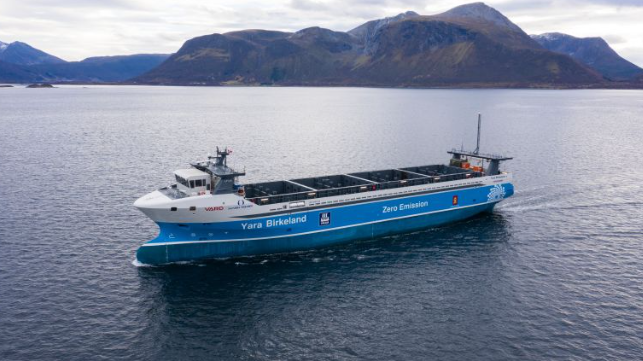Vard Delivers World's First Electric, Autonomous Container Feeder

Fincantieri's Vard division has delivered the zero-emissions container vessel Yara Birkeland to her owner, fertilizer manufacturer Yara International. The 120 TEU Yara Birkeland is the world's first battery-electric container feeder for commercial use, and the project partners' ultimate goal is to operate her as an autonomous vessel.
The vessel's hull was built by Vard's Braila yard in Romania, and initially her outfitting and delivery were slated for completion at Vard Brevik. The work was later transferred to Vard Brattvaag, and a planned second-quarter delivery was pushed back due to the COVID-19 pandemic. Now that she has been delivered, she will undergo further testing and autonomous system development at a designated area near Horten, Norway.
"We have been through an exiting process with technological development and have gained a great amount of knowledge about such type of vessels, which we will continue drawing experiences from going forward. This is an example of how flexible we need to be in order to adapt to new technology and changes in the maritime industry," Vard said in a statement. "We wish Yara the best of luck developing the vessel further and we look forward to seeing it coming into operation soon."

that matters most
Get the latest maritime news delivered to your inbox daily.
For the first phase of the project, a detachable bridge with equipment for maneuvering and navigation has been installed. In the future, when the ship is ready for autonomous operation, this module will be lifted off.
In commercial deployment, the vessel will transport fertilizer from Yara's Porsgrunn fertilizer plant to the deep-sea ports of Larvik and Brevik, a journey of about 30 nautical miles. According to Yara and project partner Kongsberg, the vessel's operations will reduce NOx and CO2 emissions by reducing diesel-powered truck transport by around 40,000 journeys per year. This will reduce road congestion as well as the operation's environmental footprint.
